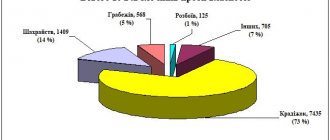ST 282 of the Criminal Code of the Russian Federation.
1. Actions aimed at inciting hatred or enmity, as well as humiliating the dignity of a person or group of persons on the basis of gender, race, nationality, language, origin, attitude to religion, as well as belonging to any social group, committed publicly, in including using the media or information and telecommunication networks, including the Internet, by a person after he has been brought to administrative responsibility for a similar act within one year -
shall be punishable by a fine in the amount of three hundred thousand to five hundred thousand rubles, or in the amount of the wages or other income of the convicted person for a period of two to three years, or by forced labor for a period of one to four years with deprivation of the right to hold certain positions or engage in certain activities for for a term of up to three years, or imprisonment for a term of two to five years.
2. Actions aimed at inciting hatred or enmity, as well as humiliating the dignity of a person or group of persons on the basis of gender, race, nationality, language, origin, attitude to religion, as well as belonging to any social group, committed publicly, in including using the media or information and telecommunication networks, including the Internet:
a) with the use of violence or the threat of its use;
b) by a person using his official position;
c) an organized group, -
shall be punishable by a fine in the amount of three hundred thousand to six hundred thousand rubles, or in the amount of the wages or other income of the convicted person for a period of two to three years, or by forced labor for a period of two to five years with deprivation of the right to hold certain positions or engage in certain activities for a period of up to three years, or imprisonment for a term of three to six years.
Commentary to Art. 282 of the Criminal Code
1. The objective side of the crime is expressed in the form of actions aimed at: a) inciting hatred or enmity; b) humiliation of the dignity of a person (group of persons) on the basis of gender, race, nationality, language, origin, attitude to religion, as well as membership in any social group. Alternatively, the method of performing actions (using the media) or the setting for their performance (public) are indicated. These actions consist of public dissemination of information, speeches at meetings, rallies, distribution of leaflets, posters, placement of relevant information in magazines, brochures, books, in public information and telecommunication networks, including the Internet. The information indicates the inferiority or, conversely, the superiority of persons belonging to a certain race, nationality, etc.; the necessity is justified or justified for genocide, mass repressions, deportations, the use of violence, the commission of other illegal actions against representatives of any nation, race, confession, etc.
Ordinary criticism of political organizations, ideological and religious associations, political, ideological or religious beliefs, national or religious customs does not fall within the scope of Art. 282 of the Criminal Code of the Russian Federation. On the objective signs of a crime, also see paragraph 7 of the Resolution of the Plenum of the Supreme Court of the Russian Federation of June 28, 2011 No. 11 “On judicial practice in criminal cases involving crimes of an extremist nature.”
The specified actions with the use of violence or the threat of its use; by a person using his official position; by an organized group (Part 2) form a qualified crime.
2. The subjective side is characterized by direct intent with the aim of inciting hatred or enmity or humiliating the dignity of a person (group of persons) on the specified grounds. Statements or judgments using facts of interethnic, interfaith or other social relations in scientific or political discussions and texts that do not pursue these goals do not fall under Article 282 of the Criminal Code of the Russian Federation.
3. In the absence of intent, actions for the mass distribution of extremist materials are qualified under Art. 20.29 Code of Administrative Offenses of Russia.
Types of hatred and their signs
Discord and intolerance of some towards others have always been the reason for inciting internecine wars. Despite the fact that times have changed, the manifestation of intolerant attitudes towards representatives of another nation or religion remains.
This is the scourge of the modern century, and therefore the law seeks to suppress such forms of behavior. The concept of “discord” is usually understood in three aspects of its content: interethnic, interracial, religious .
It is worth dwelling in more detail on each of these types.
- Interethnic strife. These are any actions whose purpose is to convince the public that one nationality is superior to all others, or to any particular group of often closely related nations. It can be expressed from a simple insult to representatives of another nation to the commission of violent acts. Unfortunately, this is a fairly common case in the realities of our country, which unites dozens of nationalities under one flag.
- Interracial strife. This type of hostility is based on the difference between races and the attitude of representatives of one race towards representatives of another. This situation is more typical of Western Europe and the USA, where slave labor of representatives of the African continent was used for many years, which subsequently resulted in all kinds of oppression of representatives of the Negroid race.
- Religious strife. This is hostility based on differences of religions. It consists in asserting the superiority of one religion over all others with a claim to its truth. It is implemented more often through open, aggressive propaganda with humiliation of representatives of other religions.
Second commentary to Art. 282 of the Criminal Code of the Russian Federation
1. Object - social relations and interests related to the implementation of the constitutional ban on inciting social, racial, national or religious hatred (Article 13 of the Constitution of the Russian Federation).
2. The objective side of the crime provided for in Part 1 of Art. 282 of the Criminal Code of the Russian Federation, is characterized by actions aimed at inciting hatred or enmity, as well as humiliating the dignity of a person or group of persons on the basis of gender, race, nationality, language, origin, attitude to religion, as well as membership in any social group. Moreover, criminal liability arises only if these actions are committed in a certain way - publicly, including using the media or information and telecommunication networks, including the Internet, after bringing the subject to administrative responsibility for a similar act in within one year.
The incitement of this hatred or enmity is understood as an attempt to create conflicts between citizens of different nationalities, races, confessions (their religious affiliations), social groups, committed publicly or using the media or information and telecommunication networks, including the Internet.
Humiliation of human dignity is an expression of discriminatory attitude towards certain individuals depending on the above characteristics (gender, race, nationality, etc.).
The crime is completed from the moment the acts specified in Part 1 of Art. 282 of the Criminal Code.
3. The subjective side of the crime is characterized by direct intent. The person is aware that he is performing the actions specified in the disposition of the commented article, and desires this. A sign of the subjective side is also the purpose specified in Part 1 of the commented article.
4. A special subject of a crime is a person who has reached the age of 16 and who has been brought to administrative responsibility for a similar act within a year.
5. Part 2 of this article establishes the elements of inciting national, racial or religious hatred under aggravating circumstances. These are actions aimed at inciting hatred or enmity, as well as humiliating the dignity of a person or group of persons on the basis of gender, race, nationality, language, origin, attitude to religion, as well as belonging to any social group, committed publicly, in including using the media or information and telecommunication networks, including the Internet:
a) with the use of violence or the threat of its use;
b) by a person using his official position;
c) an organized group.
Meaning of number 282 angel numerology
Number 282 is a combination of the energies of number 2 and number 8.
The influence of the number 2 is enhanced because it appears twice in this number.
Number 2 symbolizes stability, balance, harmony, service to others, adaptability, optimism, compatibility, cooperation, faith, trust, compromise, relationships, partnership, teamwork, duality and mediation.
This number also symbolizes finding and serving your soul's path and mission in this life.
Number 8 symbolizes self-confidence, achieving success, service to humanity, inner wisdom, the universal laws of cause and effect, karma, and the manifestation of wealth and abundance.
As a blend of all these energies, number 282 signifies fulfilling your soul's purpose and mission, service to others and humanity at large, inner wisdom, duality, balance, adaptability, karmic events, making wealth and abundance a reality, cooperation, compromise, teamwork, relationships , optimism and compatibility.
Third commentary to Article 282 of the Criminal Code of the Russian Federation
1. The Constitution of the Russian Federation (Article 19) guarantees equality of rights and freedoms of man and citizen, regardless of race, nationality, or attitude to religion. “Propaganda or agitation that incite social, racial, national or religious hatred and enmity is not permitted. Propaganda of social, racial, national, religious or linguistic superiority is prohibited” (Part 2 of Article 29 of the Constitution). The object of this crime is the constitutional rights of citizens, their honor and dignity. Here, in essence, we are talking about the political rights and ideological freedom of citizens. ——————————— Ideology is understood as a system of views and ideas that express the main, fundamental interests of certain social groups (See: Kokorin A.A. Op. op. p. 24).
2. The objective side of the crime is expressed in actions to incite hatred or enmity, as well as humiliation of the dignity of a person or group of persons on the grounds indicated above. Most often, they are associated with the dissemination of ideas and views that undermine trust and respect on the basis of gender, race, nationality, language, origin, attitude to religion or membership in any social group, or cause hostility or hatred on the same grounds. The dissemination of these ideas and views can be in the form of agitation and propaganda, expressed in oral, written or visually demonstrative forms. At the same time, ideas and views are of a general nature and are not addressed to a specific individual. For qualification, it does not matter whether the features and traits attributed to a particular nation or race correspond to reality or not. The main purpose of the act is to sow mutual distrust between people of different nationalities, races, and religious denominations, to develop, on the basis of tendentious, offensive or slanderous judgments, mutual alienation and suspicion, turning into persistent hostility. Actions aimed at humiliating the dignity of a person or a group of people have a local goal - to humiliate, insult, show the inferiority, inferiority, ugliness, limitations of people of a particular nationality or an individual citizen. Such actions can occur independently or act as an integral element of previous acts of incitement to hatred. The crime is completed from the moment the specified acts are committed (formal composition). Due to the characteristics of the object of this crime, it does not absorb the elements of slander (Article 129 of the Criminal Code), therefore, if there are signs of these crimes, qualification in combination with Art. 282 of the Criminal Code. The concepts of publicity and the use of the media in the commission of a crime are similar to those given in the analysis of Art. 280 CC.
3. The qualified types of the crime in question (Part 2) are its commission: a) with the use of violence or with the threat of its use; b) by a person using his official position; c) an organized group. The use of violence or the threat of its use covers all types of harm to health, with the exception of cases of intentional infliction of grievous harm to health (Article 111 of the Criminal Code), which are classified in conjunction with the crime in question. A threat has a qualifying meaning if it is expressed as real and there were grounds to fear its implementation (see commentary to Article 119). The use of official position in the commission of this crime means that there is a causal connection between the fact of available opportunities due to official position (power functions, availability of technical means, etc.) and the fact of inciting national, racial or religious hatred. On the concept of an organized group, see the commentary in Art. 35 of the Criminal Code.
4. The subjective side is characterized by guilt in the form of direct intent. Motives, depending on the direction of actions (objective side), can be different, but most often they have a religious-nationalist overtones. The goals follow from the direction of the actions in question - to incite hatred or enmity, as well as to humiliate the dignity and honor of a person or group of persons on the grounds indicated above.
5. The subject can be any sane person who has reached the age of 16 years;
according to clause “b”, part 2 - holding an official position. ‹ Article 281. SabotageUp Article 282.1. Organization of extremist community ›
Responsibility
Depending on which part of Article 282 of the Criminal Code of the Russian Federation the crime is classified under, the punishment may be:
- In case of incrimination in part one - a fine, the amount of which can reach five hundred thousand rubles, forced labor for a total term of up to four years, imprisonment for a term of up to five years. If the defendant held any position, he may receive a ban on performing these duties for up to three years.
- In case of incrimination of the second part, that is, acts committed with aggravating circumstances - a fine of up to six hundred thousand rubles, compulsory labor for up to five years and deprivation of the right to perform official duties, imprisonment for up to six years.
When passing a sentence, the court proceeds from two factors: firstly, the severity of the consequences of the crime committed for the victim and society as a whole, and secondly, the degree of cruelty and motive.
Tips on where to turn if the site turns out to be fraudulent.
And here are the features of bankruptcy of a municipal unitary enterprise.
Incitement of hatred on the Internet
Today, social networks and Internet sites are one of the main places for the spread of hostility. From the point of view of legislation, it does not matter in what form calls for hostility were disseminated. Therefore, the Internet is only one of the means of propaganda.
It is only important to distinguish hate crimes from ordinary insults. To do this, specific statements and actions of the accused are assessed. As a rule, special linguistic expertise is used for this.
What is humiliation of human dignity?
Human dignity is the spiritual core of personality. A person who has such a core will not commit immoral acts.
He defends the interests of goodness, truth, justice, is proud of the spiritual culture and traditions of his people, and does not allow himself to be manipulated.
Human dignity cannot be considered outside of society. National, religious, social, individual and personal differentiation of society has a direct impact on the feelings, consciousness, and level of human dignity.
National and religious strife push some people to recognize the dignity only of those who belong to their race, nationality, religious or other beliefs. They consider the rest of the citizens to be wretched, while their rights and freedoms are infringed, their dignity is insulted and humiliated.
The extreme expression of absolutism of nationalist dignity is considered to be fascism, which does not recognize any persons other than the chosen few.
The formation of dignity is complicated by multiple contradictions of a national, class, and religious nature, making it flawed, truncated, and deformed.
The word “honor” is close to the concept of “dignity” . Both of these concepts imply self-respect, spiritual and moral independence and express the spiritual principle that constitutes the moral basis of human dignity.
But if honor is an attitude towards a person’s personality in society, his reputation, then dignity is a person’s attitude towards himself, his principles, internal beliefs, ideology.
Constitutional law prohibits humiliation of the honor and dignity of an individual.
Humiliation is human behavior aimed at suppressing and violating the sense of dignity both in the person himself and in the eyes of others.
You can humiliate a person unconsciously or intentionally, for the purpose of self-affirmation or in the course of education. It is important to note that humiliation can cause psychological trauma and serious nervous disorders.






